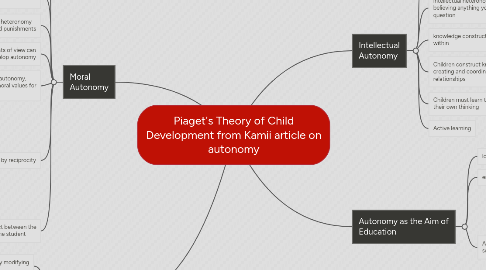Piaget's Theory of Child Development from Kamii article on autonomy
by Denise Wallace


1. Intellectual Autonomy
1.1. Governed by oneself intellectually
1.2. intellectual heteronomy means believing anything you are told without question
1.3. knowledge constructed from within
1.4. Children construct knowledge by creating and coordinating relationships
1.5. Children must learn to trust their own thinking
1.6. Active learning
2. Moral Autonomy
2.1. morals governed by oneself
2.2. adults are rarely truly moral
2.3. Ideally people become more morally autonomous as they get older. This is not often the case.
2.4. Adults reinforce heteronomy with rewards and punishments
2.5. Exchanging points of view can help a child develop autonomy
2.6. In order to develop moral autonomy, children must construct moral values for themselves
2.7. Sanctions by reciprocity
2.7.1. Temporary or permanent exclusion from the group
2.7.2. Calling the child's attention to the direct and material consequences of his act
2.7.3. Depriving the child of the thing that he has misused
2.7.4. restitution
2.8. Mutual respect between the teacher and the student
3. Autonomy as the Aim of Education
3.1. logical thinking
3.2. emphasize thinking
3.3. Autonomous skills taught in schools
3.3.1. reading
3.3.2. writing
3.3.3. calculating
3.3.4. comprehending maps and charts
3.3.5. placing events in history

